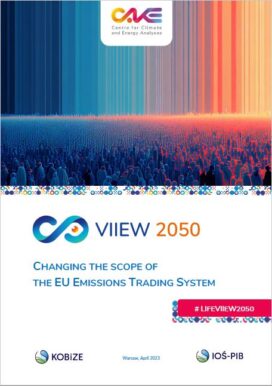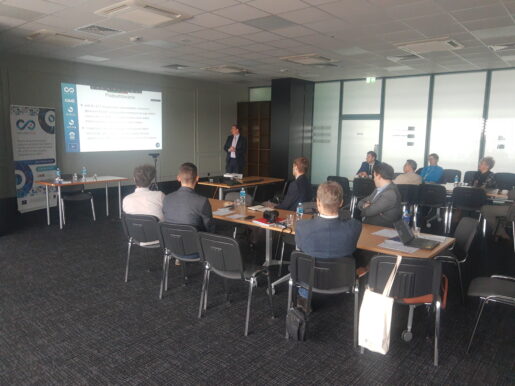LIFE VIIEW 2050 meeting with public administrations on the vision and development of the EU ETS in a 2050 perspective
On 12 April 2023, a meeting for the public administration, was held in a stationary and online format, during which the results of the first study ‘VIIEW on EU ETS 2050: Changing the scope of the EU Emissions Trading System‘, prepared within the framework of the LIFE VIIEW 2050 project was presented. The meeting was attended by representatives of the KOBIZE/IOŚ-PIB management, CAKE experts from the LIFE VIIEW 2050 project and invited guests representing various governmental authorities.
- The analysis is available:
 VIIEW on EU ETS 2050: Changing the scope of the EU ETS (7.5 MiB, 1,863 hits)
VIIEW on EU ETS 2050: Changing the scope of the EU ETS (7.5 MiB, 1,863 hits)
 During the meeting, Robert Jeszke, Head of CAKE and Project Coordinator of the LIFE VIIEW 2050 project, gave a brief introduction to the subject of the objectives and scope of the analysis carried out and briefly discussed its main elements. Then, CAKE experts from the LIFE VIIEW 2050 project team presented the main elements and detailed conclusions resulted form the prepared LIFE VIIEW analysis.
During the meeting, Robert Jeszke, Head of CAKE and Project Coordinator of the LIFE VIIEW 2050 project, gave a brief introduction to the subject of the objectives and scope of the analysis carried out and briefly discussed its main elements. Then, CAKE experts from the LIFE VIIEW 2050 project team presented the main elements and detailed conclusions resulted form the prepared LIFE VIIEW analysis.
Maciej Pyrka, CGE modelling expert, presented information on the development of modelling tools and sectoral models that were used in the VIIEW on the EU ETS 2050 analysis, as well as informed about the scenarios used . He emphasised that the results of analysis of the feasibility of expanding the ETS show, in particular, that the inclusion of new sectors in emissions trading will be associated with an increase in marginal abatement costs, mainly due to more expensive abatement options available in sectors not currently covered by the ETS (non-ETS).
Igor Tatarewicz, energy modelling expert, presented the main conclusions in the context of the future of the energy sector in the 2050 perspective. He emphasised that the different scenarios for the inclusion of non-ETS sectors in the ETS have no significant impact on the rate of transformation of the energy sector, as already in the Fit55 scenario fossil fuels are almost completely replaced by low- and zero-carbon technologies.
Artur Gorzałczyński, transport sector modelling expert presented the results of an analysis relating to the future of the passenger and freight transport sector in the 2030 and 2050 perspectives. One of the main findings of the analysis is the great potential for the rapid replacement of diesel buses with electric and hydrogen equivalents, a process which has already begun in many European cities, including Poland. This process is beneficial for the Polish economy, as Poland is the leading producer of electric buses in the EU.
Adam Wąs, agricultural modelling expert, pointed out that a significant reduction in greenhouse gas emissions in the agricultural sector translates into production volumes through a serious reduction in the value of food production, which is particularly evident in the case of Poland.



 Reset ustawień
Reset ustawień Kontrast
Kontrast Widok
Widok Czytelność
Czytelność Czcionka
Czcionka Znaki
Znaki Interlinia
Interlinia Słowa
Słowa Akapity
Akapity Deklaracja dostępności
Deklaracja dostępności









